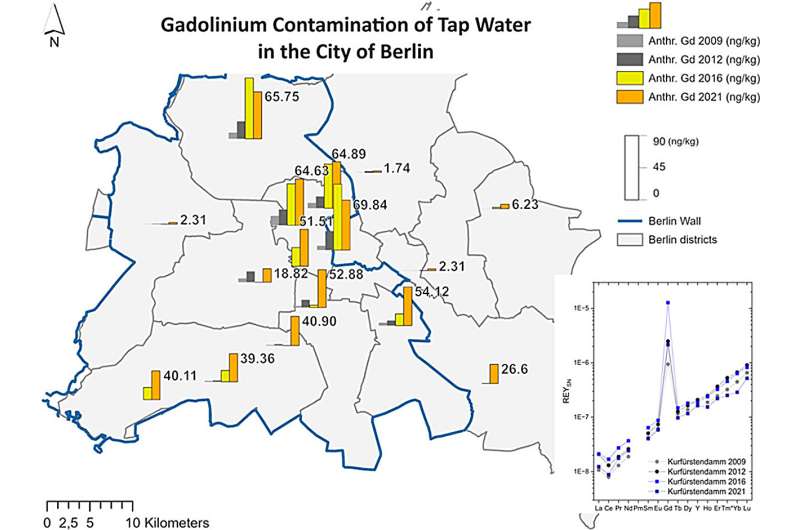This article has been reviewed according to Science X's editorial process and policies. Editors have highlighted the following attributes while ensuring the content's credibility:
fact-checked
peer-reviewed publication
trusted source
proofread
Researchers show impact of COVID-19 and climate change on drinking water quality in Berlin

A research team from Constructor University, led by geochemist and geoscientist Prof. Dr. Michael Bau, and including his former students Lea Krohn, Franziska Klimpel and Pauline Béziat, has presented a new study on the effects of COVID-19 and climate change on wastewater-derived substances in urban drinking water in Berlin, Germany. The study was published in Water Research.
Using an adapted analytical procedure, the researchers were able to time- and cost-efficiently determine concentrations of rare earth elements in tap water in Berlin. The tap water shows anomalously high levels of gadolinium, a rare earth element that is used as contrast agent during MRIs.
The gadolinium-based contrast agents are injected into the patients who excrete them after the treatment. Thus, the anthropogenic gadolinium ends up in wastewater and because it is not removed in wastewater treatment plants, it enters rivers and lakes, and eventually groundwater and drinking water.
At the currently observed concentrations the anthropogenic gadolinium is not dangerous for humans, but it reveals the potential presence of other, more toxic, wastewater-derived substances in the drinking water.
The study showed that anthropogenic gadolinium in Berlin's tap water increased on average 30-fold between 2009 and 2021 and that it has now also contaminated the drinking water of the eastern districts of the city.
In many Berlin districts, almost all of the gadolinium in the tap water now comes from MRI contrast agents. However, after a very strong and continuous increase, the tap water composition responded quickly to the reduced number of MRI scans during the COVID-19 pandemic years, showing that the tap water reacted quickly to this input change.
These results highlight that gadolinium is an effective and very sensitive tracer for the presence of wastewater-derived substances in drinking water. Such xenobiotics will become a challenge in large cities like Berlin, where climate change causes groundwater resources to decline, as the suggested mitigation measures such as artificial groundwater recharge with surface water will inevitably lead to an increase of wastewater-derived substances in drinking water.
It is therefore urgently necessary to monitor these so-called wastewater-borne substances in drinking water, especially in Berlin, which can be done reliably and cost-effectively using anthropogenic gadolinium as an indicator.
More information: Lea M. Krohn et al, Impacts of COVID-19 and climate change on wastewater-derived substances in urban drinking water: Evidence from gadolinium-based contrast agents in tap water from Berlin, Germany, Water Research (2024). DOI: 10.1016/j.watres.2024.121847
Journal information: Water Research
Provided by Constructor University




















